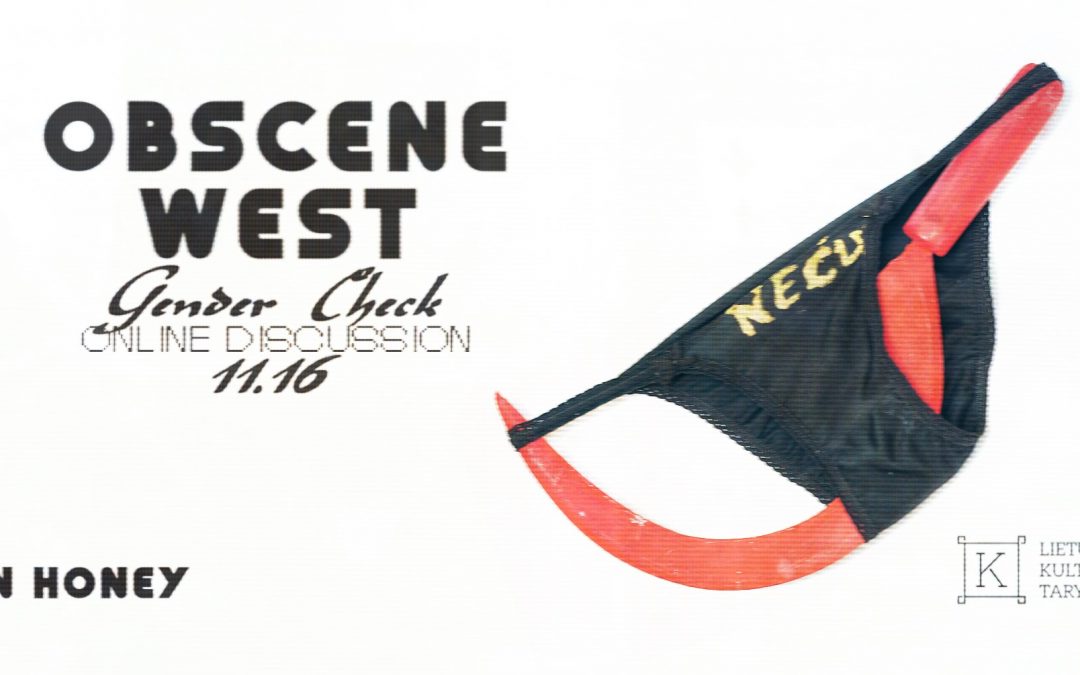This autumn, Kaunas Artists’ House invites you to look back on the 1990s – a period of social, political and cultural changes in Lithuania and the world – and presents a project and a series of events called “Obscene West. In Honey”, dedicated to female artists who were actively creating at that time. On November 16, 6 p.m. (EET) / 5 p.m. (CET) the series will continue with an online discussion that will review “Gender Check”, one of the most significant exhibitions in the world of European art in recent decades, presenting artists from the former Soviet Bloc countries to the audience of Vienna and Europe in general.
The discussion will be attended by the internationally acclaimed curator of the exhibition Bojana Pejić (Serbia/Berlin) and cultural critic and art historian Katrin Kivimaa (Estonia), who acted as a researcher in the context of the exhibition. The discussion will be moderated by art critic, artist and writer Laima Kreivytė (Lithuania), who also contributed to the initiation of the exhibition and participated in it as a curator.
In 2007, The ERSTE Foundation and PATTERNS (Cosmin Costinas, Veronica Kaup-Hasler, Piotr Piotrowski and Georg Schöllhammer) invited seven curators from different countries to work together on an idea to mark the twentieth anniversary of the collapse of the so-called Iron Curtain. Of all the proposals submitted, the project by Bojana Petić was chosen. It is an exhibition that looked at the changing gender roles in Eastern European art from the 1970s to the present day. It required extensive international research. In preparing the exhibition, twenty-five art historians and critics explored archives, museums, libraries, artists’ legacies and exhibition catalogues in 24 countries including Lithuania, Bulgaria, Armenia, and the former German Democratic Republic.
The “Gender Check” exhibition, shown at the Museum of Modern Art in Vienna from November 2009 until February 2010, became the first comprehensive presentation of the Eastern European art of the second half of the twentieth century that was focused on gender roles. The exhibition featured more than 200 artists and 400 works – paintings, sculptures, installations, photographs, posters, films, and videos – revealing the change in gender representation, with a special emphasis on their change in different socio-political contexts. With these works Gender Check introduced a hitherto little-known chapter in art history and created a medium for change in contemporary gender role discourse.
Bojana Pejić, the initiator and curator of the exhibition, testifies to its importance as a “platform for a first feminist reading of the art in Eastern Europe produced since the late 1960s till 2009”. She is an independent art historian, lecturer and curator born in Belgrade, based from 1991 in Berlin, writing on contemporary art for over 40 years. Her curatorial projects are generally focused on post-socialist Europe. The most important have been “After the Wall – Art and Culture in the Post-Communist Europe (Stockholm, Berlin, Budapest 1999-2001) and “Gender Check”.
According to Katrin Kivimaa, this groundbreaking project was significant in terms of both national and transnational research: “For me personally, this groundbreaking project was significant in terms of both national and transnational research: It offered me an opportunity for an in-depth study of representations of gender, i.e. the visualisation of different gender roles and ideologies, in Estonian art of the late 20th and early 21st century. It also defined the direction of my research and professional activities for several years after. In 2010, I co-curated with Kädi Talvoja The Soviet Woman in Estonian Art, 1945–1965 in Kumu Art Museum in Tallinn. In 2011-2012, I was part of the research network Transnational perspectives on women’s art, feminism and curating, led by University of Brighton. In the framework of this network, I edited a collection of essays Working with Feminism: Curating and Exhibitions in Eastern Europe (Tallinn University Press, 2012) which paid special attention to feminism and curating in the countries of the Baltic Sea area.”
The context of this exhibition will be used in the discussion in order to respond to and compare the issues relevant in art at that time and today, using curatorial and artistic strategies, feminist practices.
The event will be held in English and streamed via Kaunas Artists’ House Facebook page. The event is co-hosted and will be streamed by regional art and feminist organisations: Echo Gone Wrong, Feministeerium and Latvian Center for Contemporary Art (LCCA).
“Obscene West. In Honey”, named after Eglė Rakauskaitė’s performance/video installation Meduje (in honey) made in 1996, will analyze the issues of gender roles and sexuality in the changing 1990s, and examine the manifestations of feminist movements in Lithuanian art as well as the other post-Soviet countries.
The project is organised by Kaunas Artists’ House.
The project is funded by the Lithuanian Council for Culture.
The project is curated by Agnė Bagdžiūnaitė and Edvinas Grinkevičius
Project design: Studio Cryo.

